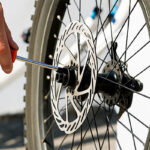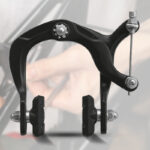The state of your bicycle brakes has a big impact on your safety when riding a bike. Well-maintained brakes are essential for a smooth and safe ride, whether you’re riding at a leisurely pace or commuting through busy city streets or difficult mountain routes. As a reputable bicycle brake manufacturer in India, S.K. Aggarwal & Co., we know how important trustworthy braking systems are. Therefore through this guide we will provide you with 5 warning indicators that will help you decide when to replace your bicycle brakes.
Squeaking or Grinding Noises
Unusual noises are one of the most prevalent indicators that your brakes require maintenance. When you press the brakes and hear squeaking, screaming, or grinding noises, it’s clear that something is wrong. These sounds usually indicate that the brake rotors are being damaged by metal contacting metal due to worn-out brake pads. It’s critical to respond to these sounds right away because ignoring them may lead to more serious problems.
Reduced Braking Performance
Has the time it takes for your bike to come to a complete stop changed? This decrease in stopping power is a warning sign that the brake fluid in hydraulic systems may be low or that your brake pads may be worn down. We advise the riders to inspect their brakes frequently and take note of any loss in reactivity. It’s time for a replacement if your brakes aren’t stopping as well as they used to.
Visible Wear on Brake Pads
Although brake pads are meant to deteriorate with time, they need to be replaced after a specific amount of wear and tear. If you regularly check your brake pads and find they are less than 1/4 inch thick, it’s time to replace them. Furthermore, the brake pads won’t function well enough if they show signs of uneven wear or cracks. We stress the significance of utilizing premium brake pads to guarantee optimal safety and longevity.
Vibration or Pulsation When Braking
When you press the brakes, if the handlebars or brake levers vibrate or pulse, it may indicate that your brake rotors are uneven or deformed. Brake overheating or extended use may be the cause of this problem. If warped rotors are not fixed, they can cause more damage and lessen the efficacy of your braking system. To keep your bike’s braking system in peak shape, we offer precision-engineered rotors as part of our selection of bicycle brake parts in India.
Brake Levers Feel Soft or Spongy
When you apply pressure to your brake levers, they should feel solid and responsive. If they feel mushy, spongy, or take too much pressure to engage, it indicates that air may have entered the hydraulic system or that the brake fluid needs to be changed. This may indicate that the cables on mechanical brakes need adjustment or are stretched. It is imperative to resolve the issue of soft brake levers right away because they can result in hazardous situations. As a bicycle brakes manufacturer we advise routine maintenance to keep your braking system operating at its best.
Conclusion
To sum up, being aware of the signs that signal the need for brake replacement is crucial for every cyclist. The safety and performance of your bike depend heavily on well-maintained brakes. Squeaking sounds, diminished stopping power, visible wear, vibrations, and unresponsive brake levers are all warnings that should prompt immediate action. By addressing these issues promptly and opting for high-quality replacements from reputable brands like Sprandom, you can ensure a safer riding experience. Regular inspections and maintenance will not only enhance your bike’s performance but also provide you with the confidence to tackle any ride, knowing your brakes are up to the task.
Read More About “The Role of Bicycle Brakes in Ensuring Rider Safety”





